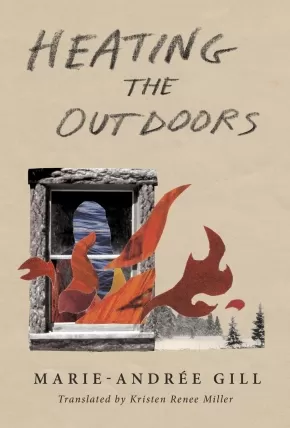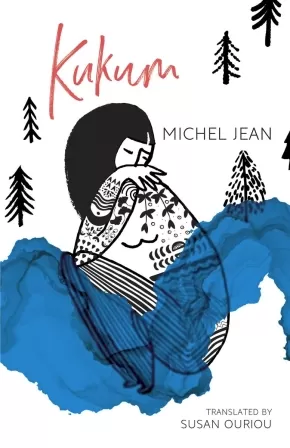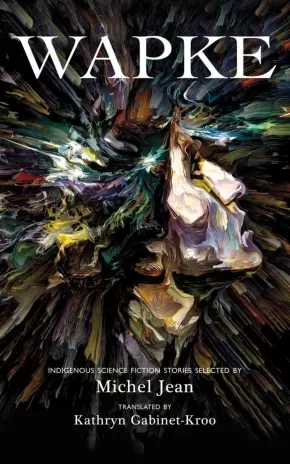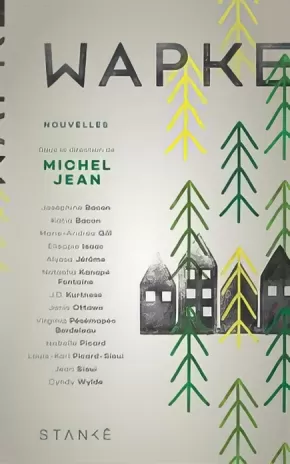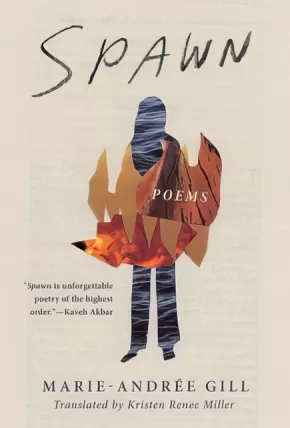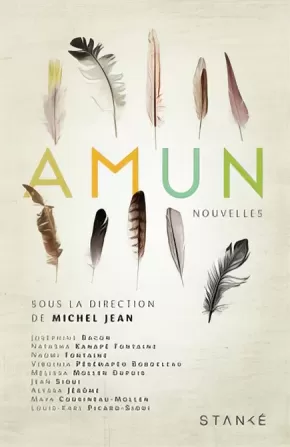Mashteuiatsh (Pekuakamiulnuatsh)
Synopsis:
You're the clump of blackened spruce
that lights my gasoline-soaked heart
It's just impossible you won't be back
to quench yourself in my crème-soda
ancestral spirit
Irreverent and transcendent, lyrical and slang, Heating the Outdoors is an endlessly surprising new work from award-winning poet Marie-Andrée Gill.
In these micropoems, writing and love are acts of decolonial resilience. Rooted in Nitassinan, the territory and ancestral home of the Ilnu Nation, they echo the Ilnu oral tradition in Gill's interrogation and reclamation of the language, land, and interpersonal intimacies distorted by imperialism. They navigate her interior landscape—of heartbreak, humor, and, ultimately, unrelenting light—amidst the boreal geography.
Heating the Outdoors describes the yearnings for love, the domestic monotony of post-breakup malaise, and the awkward meeting of exes. As the lines between interior and exterior begin to blur, Gill's poems, here translated by Kristen Renee Miller, become a record of the daily rituals and ancient landscapes that inform her identity not only as a lover, then ex, but also as an Ilnu and Québécoise woman.
Awards
- 2020 Indigenous Voices Award for Best Published Poetry in French winner. This book is the translated version in English.
Reviews
"I'm literally captivated by the accuracy, the beauty. They taste of honey, these poems." —Karine Villeneuve, bookseller, Page par Page
"Heating the Outdoors is a stunning collection exploring heartbreak, and the awkward dance between exes from the positionality of an Ilnu and Québécoise woman whose poetic 'gasoline-soaked heart' yearns deeply for love. Translated by Kristen Renee Miller from French into English, Gill's Heating the Outdoors re-wilds the ritualistic humdrum of domestic life while honouring the land and her 'crème-soda ancestral spirit.'" —Shannon Webb-Campbell, author of Lunar Tides and I Am a Body of Land
"These poems live in a bachelor apartment over the corner store. They're on the bus looking out at the muddy hangtime between winter and spring, in a too-warm jacket. These poems will make you a cup of tar-coffee and tell you about the ache of desire in the language of crunching snow. You'll come back to them over and over again to listen." —Carleigh Baker, author of Bad Endings
“Marie-Andrée Gill’s spare, luminous micropoems are endlessly surprising, twisting out, into, and unto themselves like complicated lovers. Defiantly fragmentary, these are stunning shards of tongues, embodied vernaculars slowly, steadily unsettling grammars. Kristen Renee Miller’s translations retain the elegance and shimmer of the originals while wondrously conveying their knottedness, their syntax of skin. When at last we reach Nitassinan, we are reminded of the worlds poetry documents, but also of the worlds it creates. This is poetry that claims the power to 'gnaw the meat off each day and spit out the pin bones' through a language as unresolved as our decolonial dreams and as necessary as our sovereign desires.” —Urayoán Noel, author of Transversal
Additional Information
98 pages | 5.25" x 7.75" | Paperback
Synopsis:
A Quebec bestseller based on the life of Michel Jean's great-grandmother that delivers an empathetic portrait of drastic change in an Innu community.
Kukum recounts the story of Almanda Siméon, an orphan raised by her aunt and uncle, who falls in love with a young Innu man despite their cultural differences and goes on to share her life with the Pekuakami Innu community. They accept her as one of their own: Almanda learns their language, how to live a nomadic existence, and begins to break down the barriers imposed on Indigenous women. Unfolding over the course of a century, the novel details the end of traditional ways of life for the Innu, as Almanda and her family face the loss of their land and confinement to reserves, and the enduring violence of residential schools.
Kukum intimately expresses the importance of Innu ancestral values and the need for freedom nomadic peoples feel to this day.
Educator Information
Translated by Susan Ouriou.
Additional Information
224 pages | 5.50" x 8.50" | Paperback
Synopsis:
Wapke—meaning “tomorrow” in the Atikamekw language—is Quebec’s first collection of science fiction short stories by Indigenous writers. Fourteen authors from various nations and different backgrounds project us into the future through their moving, poetic, worrying, and sometimes fantastical tales, addressing current social, political, and environmental themes. From time travelling Indigenous warriors to rebellious language and knowledge keepers, from Big Trees in a lake to a human sausage factory, from living on the land to living in cyberspace, these stories provide a trans-Indigenous colonial critique. The brainchild of Michel Jean, Wapke can be read on different levels: as pure entertainment for sci-fi fans or as a stimulant to serious reflection. It offers an often-captivating social commentary that reveals how Indigenous people view the future as well as a hope that change will come.
Educator Information
This book is available in French: Wapke
Additional Information
160 pages | 5.00" x 8.00" | Paperback
Synopsis:
Wapke – « demain » en langue atikamekw – est le premier recueil de nouvelles d'anticipation autochtone publié au Québec. Quatorze auteurs de nations et d'horizons multiples se projettent dans l'avenir par le biais de la fiction, abordant des thèmes sociaux, politiques et environnementaux d'actualité. Sous la direction de Michel Jean, Wapke offre un commentaire social souvent saisissant où se dessine l'espoir d'un changement.
AVEC DES NOUVELLES INÉDITES DE Joséphine Bacon (Innue), Katia Bacon (Innue), Marie-Andrée Gill (Innue), Elisapie Isaac (Inuk), Michel Jean (Innu), Alyssa Jérôme (Innue), Natasha Kanapé Fontaine (Innue), J.D. Kurtness (Innue), Janis Ottawa (Atikamekw), Virginia Pésémapéo Bordeleau (Crie), Isabelle Picard (Wendat), Louis-Karl Picard-Sioui (Wendat), Jean Sioui (Wendat) et Cyndy Wylde (Anicinape et Atikamekw)
Educator Information
This book is available in English: Wapke: Indigenous Science Fiction Stories
Additional Information
216 Pages | Paperback
Synopsis:
Spawn is a braided collection of brief, untitled poems, a coming-of-age lyric set in the Mashteuiatsh Reserve on the shores of Lake Piekuakami (Saint-Jean) in Quebec. Undeniably political, Marie-Andrée Gill's poems ask: How can one reclaim a narrative that has been confiscated and distorted by colonizers?
The poet's young avatar reaches new levels on Nintendo, stays up too late online, wakes to her period on class photo day, and carves her lovers' names into every surface imaginable. Encompassing twenty-first-century imperialism, coercive assimilation, and 90s-kid culture, the collection is threaded with the speaker's desires, her searching: for fresh water to "take the edge off," for a "habitable word," for sex. For her "true north"—her voice and her identity.
Like the life cycle of the ouananiche that frames this collection, the speaker's journey is cyclical; immersed in teenage moments of confusion and life on the reserve, she retraces her scars to let in what light she can, and perhaps in the end discover what to "make of herself".
Reviews
"Spawn is an epic journey that follows the ouananiche in their steadfast ability to hold: rigid, shimmering, hardened to the frigid waters of winter, in all of its capacities of and for whiteness. Here, poems summon a spawn of wonderworking dreams: 'a woman risen up from all these winter worlds, heaped with ice [and] ready to start again'." —Joshua Whitehead, author of Jonny Appleseed
"Spawn is unforgettable poetry of the highest order." —Kaveh Akbar, author of Calling a Wolf a Wolf
"Gill's poems are like small treasures clutched in buried tree roots, preserving 'the chalky veins' of ancestral memory pulsing just below our modern hustle." —Kiki Petrosino, author of White Blood
Educator Information
Recommended in the Canadian Indigenous Books for Schools 2020/2021 resource list for grade 12 for English Language Arts and Social Justice.
Caution: Some foul language, sexual and violent content.
Additional Information
96 pages | 5.25" x 7.75" | Translated by Kristen Renee Miller
Synopsis:
Dans la langue innue, amun signifie « rassemblement ». Sous la direction de Michel Jean, écrivain et journaliste innu, ce collectif réunit pour la toute première fois des auteurs autochtones de divers horizons, de différentes nations et générations. Leurs textes de fiction reflètent tantôt l'histoire et les traditions, tantôt la réalité des Premières Nations au Québec et au Canada. Offrant à lire les points de vue d'artistes de renom, ce livre est le théâtre d'un rassemblement et d'une prise de parole qui ne se font que trop rarement.
Avec des nouvelles inédites de Joséphine Bacon, Natasha Kanapé Fontaine, Naomi Fontaine, Virginia Pésémapéo Bordeleau, Melissa Mollen Dupuis, Jean Sioui, Alyssa Jérôme, Maya Cousineau-Mollen, Louis-Karl Picard-Sioui et Michel Jean.
Additional Information
168 Pages | Paperback

